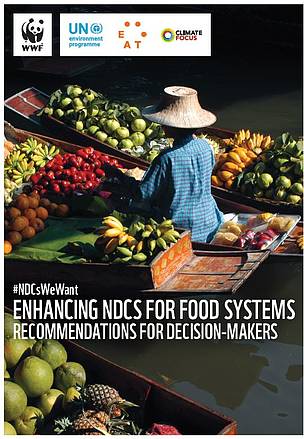Key messages :
- Existing food systems are not sustainable, being responsible for about one third of global GHG emissions. The need for transformational changes of our food systems through diversified agroecological farming that support resilient and sustainable pathways is well recognized.
- Agroecology can contribute to food security while addressing climate challenges as it boosts biodiversity, restores degraded land, improves ecosystem services and increases soil carbon sequestration. It can also improve economic performances.
- FAO developed the 10 elements of agroecology as an analytical framework to support the design of differentiated paths for agricultural and food systems transformation for increased resilience. The framework highlights four promising entry points: biodiversity, consumers, education and governance. Nexus approaches are used to highlight and examine salient interactions among different sectors and entry points, addressing the issue of silo thinking.
- The current NDC enhancement process offers an opportunity to address food systems emissions and further include agroecological practices in countries’ Nationally Determined Contributions.
Since the food system is highly dynamic and relates to various policy agendas, policymakers might want to apply a food system approach to address this complexity holistically. This means examining food systems as a whole rather than in separate parts. Agroecology and other related systemic approaches provide guidance and options for such transformation along the entire chain of food systems.
Presented resources:
- IPES (2020) BREAKING AWAY FROM INDUSTRIAL FOODAND FARMING SYSTEMSSeven case studiesof agroecological transition 110 pages
- WWF Germany & WWF Food Practice Report: Enhancing NDCs For Food Systems - recommendations for decision-makers PDF 18.40 MB 45 pages
- WWF Germany & WWF Food Practice Summary: Enhancing NDCs for Food Systems - recommendations for decision makers 5 pages
- Wetzel, A., et. al. 2020. The Food System Approach in Agroecology Supported by Natural and Social Sciences: Topics, Concepts, Applications. In book: Agroecology, Ecosystems and Sustainability. (pp.181-199). CRC Press, Boca Raton (FL). USA.
- Leippert, F., Darmaun, M., Bernoux, M. and Mpheshea, M. 2020. The potential of agroecology to build climate-resilient livelihoods and food systems. Rome. FAO and Biovision.
- Oberč, B.P. and Arroyo Schnell, A. 2020. Approaches to sustainable agriculture: exploring the pathways towards the future of farming. Brussels. IUCN EURO.
- Schulte, I. et al. 2020. Enhancing NDCs for food systems: recommendations for decision-makers. Berlin. WWF Germany and WWF Food Practice.
- Sinclair, F. et al. 2019. The Contribution of Agroecological Approaches to Realizing Climate-Resilient Agriculture. Rotterdam and Washington, DC. World Agroforestry, Bangor University and CGIAR.
- Barrios, E. et al. 2020. The 10 Elements of Agroecology: Enabling transitions towards sustainable agriculture and food systems through visual narratives. Ecosystems and People 16(1): 230-247.
- Information about WWF Thailand Project available at: https://www.wwf-scp.org/thailand/.
Objectives
- To showcase good examples of how food systems approaches based on the 10 Elements of Agroecology also increase climate resilience and how
this can be considered in National Determined Contributions (NDCs) and other national food related strategies. - To flesh out in our discussion what are the key characteristics of food systems that have become truly climate resilient.
- To find answers on how current policy processes under international frameworks (United Nations Framework Convention on Climate Change/Convention on Biological Diversity/Committee on World Food Security/Food Systems Summit 2021) could be geared towards taking a food systems approach.
- Tosi Mpanu-Mpanu, Ambassador and lead negotiator for UNFCCC, DRC;
- Fergus Sinclair, Leader Resilient Livelihood Systems at World Agroforestry (ICRAF);
- Emile Frison, International Panel of Experts on Sustainable Food Systems (IPES-Food)
The relevance of a food systems approach based on Agroecology elements for increased climate resilience
- Edmundo Barrios, Agricultural Officer at FAO.
- Ingrid Schulte, Climate Focus: Enhancing NDCs
for Food Systems
Tangible show cases
- Prof. Rajeshwar Singh Chandel, Sustainable Food Systems Platform for Natural Farming (SuSPNF), India;
- Ply Pirom, WWF, Thailand
“FLR 349”: Forest Landscape Restoration through agroecology in Thailand
- Enos Shumba, WWF, Zimbabwe;
Agroecology based Food Systems Climate Resilience and NDC – Zimbabwe Way Forward
- Allan Mortensen, Chombo Project, Verstergaard.
Founded in 1957, Vestergaard is headquartered in Switzerland with offices in India and quality control and research and development labs in Africa and Vietnam. ZeroFly® Storage Bag is the first insecticide-incorporated storage bag to prevent damaging pest infestations. It reduces the loss of seed or grains that can be consumed, stored for security, or sold for optimized prices, while not having the hazards associated with fumigation or the potential for pesticide residues that come from inaccurate insecticide spraying.
Related:
What is the Koronivia Joint Work Agriculture?Under this landmark decision, countries agreed to work together to make sure that agricultural development ensures both increased food security in the face of climate change and a reduction in emissions. The joint work will address six topics related to soils, nutrient use, water, livestock, methods for assessing adaptation, and the socio-economic and food security dimensions of climate change across the agricultural sectors.
The KJWA represents an important step forward in the negotiations on agriculture within the UNFCCC and emphasizes the importance of agriculture and food security in the climate change agenda. By mainstreaming agriculture into the UNFCCC processes, the KJWA can drive transformation in agricultural and food systems, and address the synergies and trade-offs between adaptation, mitigation and agricultural productivity.



No comments:
Post a Comment